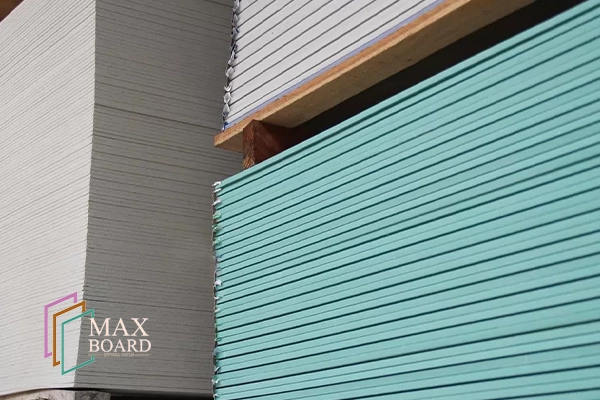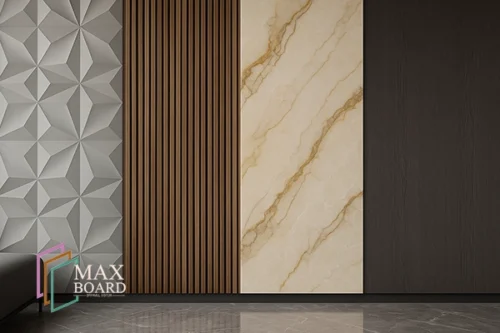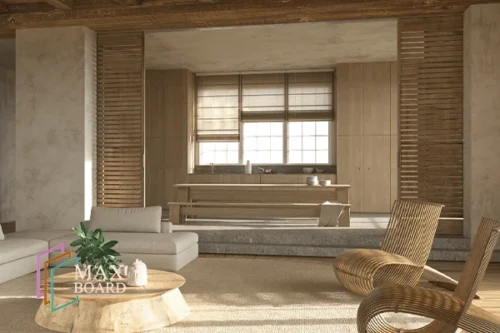gypsum board for humid environments
Gypsum boards are one of the most widely used building materials for interior walls and ceilings. But not all gypsum boards are suitable for humid environments. If you’re working on a bathroom, kitchen, laundry room, or even a semi-outdoor area, selecting the right type of board becomes critical to prevent mold, swelling, and long-term damage. That’s where moisture-resistant gypsum boards—particularly the MR H3 gypsum board—come in.
In this guide, we’ll explore the challenges of humidity in building materials, why regular gypsum fails under moisture, what sets MR H3 boards apart, and how to use them correctly for optimal results. Whether you’re an architect, contractor, or informed buyer, this article will help you make the best decision for your next humid-area project.
1. Understanding Humidity Challenges in Construction
Humidity is the presence of water vapor in the air, and while it’s natural, it poses major problems for indoor construction. Moisture infiltrates building materials through condensation, leaks, and vapor diffusion. This can lead to:
- Swelling and warping of materials
- Mold and mildew growth
- Paint and finish deterioration
- Reduced thermal and acoustic performance
- Structural instability over time
Gypsum, by nature, is a porous material. When exposed to moisture, standard gypsum boards absorb water, break down, and support microbial growth. Hence, in environments where humidity is consistent or extreme, the need for a gypsum board designed specifically for humid conditions becomes clear.
2. Why Regular Gypsum Boards Are Not Enough
Standard gypsum boards, often called drywall or plasterboard, consist of a gypsum core sandwiched between two paper liners. While they are cost-effective and easy to work with, they are designed for dry, climate-controlled spaces.
In humid environments:
- The paper face absorbs moisture, causing bubbling and peeling
- The gypsum core weakens and crumbles over time
- Joints and seams become prone to fungal growth
Trying to coat or seal standard boards with paints or waterproofing layers may delay the issue but won’t solve it long-term. The internal structure remains vulnerable. That’s why moisture-resistant gypsum board is engineered differently.
3. What Is a Moisture-Resistant Gypsum Board?
A moisture-resistant gypsum board is designed to resist water vapor and high humidity while retaining its shape, strength, and integrity. It’s made with additives and treated paper facings that slow down or block moisture absorption.
Key Features:
- Treated core resists moisture penetration
- Fiberglass or water-repellent paper facings
- Mold and mildew resistance
- Improved durability in wet zones
These boards are often green-colored to distinguish them from regular white drywall. They’re widely used in:
- Bathrooms and shower areas
- Kitchens and pantries
- Basements and crawl spaces
- Laundry rooms and utility areas
- Locker rooms and spa facilities
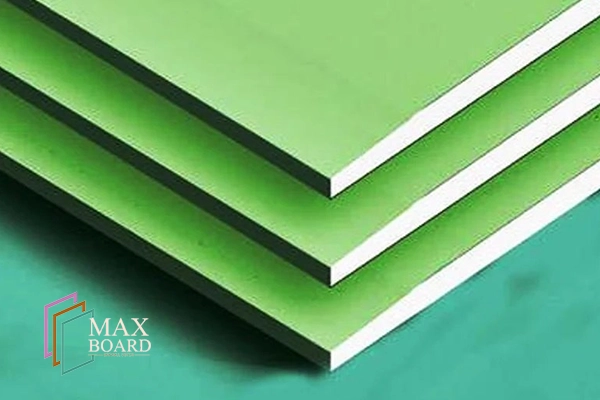
4. Introducing the MR H3 Gypsum Board: A Premium Moisture Solution
The MR H3 gypsum board is a high-grade moisture-resistant panel specifically developed for areas with continuous or frequent exposure to humidity. It represents the third level (H3) of moisture resistance, making it one of the most robust options in the market.
MR H3: What Does It Mean?
“H3” refers to a classification under European and international moisture-resistance standards. It denotes that the board can withstand:
- Long-term exposure to humid air (above 80% relative humidity)
- Intermittent direct contact with water (like splash zones)
Core Advantages of MR H3:
- Special additives in the gypsum core for enhanced water repellency
- Mold-inhibiting treatment
- High dimensional stability
- Excellent adhesion for tiles, paints, and finishes
- Easy to score, cut, and install like standard drywall
This makes it an ideal product for demanding residential and commercial installations where reliability is essential.
5. Key Benefits of Using MR H3 Gypsum Board
1. Superior Moisture Resistance
Thanks to its advanced core and treated surfaces, MR H3 resists water absorption even in high-humidity environments. This prevents swelling, cracking, or disintegration.
2. Mold and Mildew Protection
With added biocides and antifungal treatments, MR H3 helps prevent microbial growth—a major health benefit in bathrooms and kitchens.
3. Long-Term Durability
Unlike regular drywall that may last a few years in humid areas, MR H3 maintains structural integrity for decades with minimal maintenance.
4. Compatibility with Other Systems
MR H3 is suitable for:
- Tiling and waterproofing membranes
- Paints, primers, and finishes
- Wall accessories like cabinets and fixtures
5. Cost-Effectiveness
Although slightly more expensive upfront, the reduction in repair, replacement, and mold remediation costs makes MR H3 a smart investment.
6. How to Install Moisture-Resistant Gypsum Boards Correctly
To get the most out of MR H3 or any moisture-resistant board, proper installation is key.
Installation Tips:
- Use moisture-resistant joint compound and tape
- Leave expansion gaps for movement
- Seal screw holes and edges thoroughly
- Install vapor barriers behind the board if needed
- Use corrosion-resistant fasteners
Following manufacturer guidelines ensures your board performs as intended, especially in extreme environments.
7. Comparing MR H3 to Other Moisture-Resistant Panels
| Feature | MR H3 Gypsum Board | Standard Green Board | Cement Board |
|---|---|---|---|
| Moisture Resistance | Excellent (H3) | Moderate | Excellent |
| Mold Resistance | High | Medium | High |
| Ease of Installation | Easy | Easy | Difficult |
| Weight | Lightweight | Lightweight | Heavy |
| Finish Compatibility | Paint, Tile, Vinyl | Paint only | Tile only |
| Cost | Moderate | Low | High |
MR H3 strikes the perfect balance between performance and workability.
8. Environmental and Health Considerations
Indoor air quality is a growing concern, especially in wet environments where moisture can lead to invisible pollutants. MR H3 is often manufactured to low-VOC standards and may even qualify for green building certifications.
Benefits:
- Low emissions = safer indoor air
- Mold resistance = fewer allergens
- Supports green architecture
9. Real-World Applications: Where to Use MR H3 Boards
MR H3 is suitable for both residential and commercial projects:
Residential:
- Bathroom walls and ceilings
- Laundry and utility rooms
- Kitchen backsplashes
Commercial:
- Hotel bathrooms and spas
- Hospital washrooms
- Locker rooms and changing facilities
- Restaurant kitchens and food prep zones
Using MR H3 in these areas protects against wear, water damage, and microbial growth.
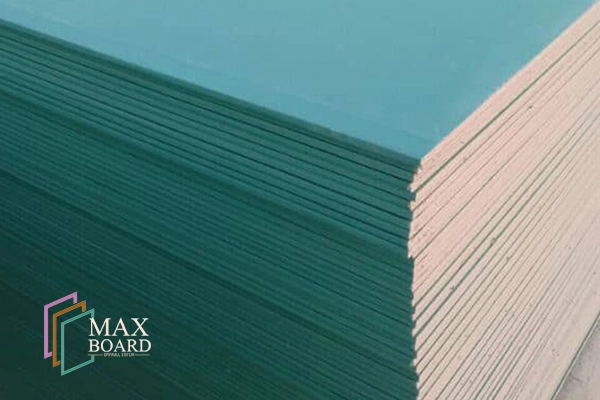
10. Tips for Maintenance and Longevity
Although MR H3 is built for durability, good maintenance can further extend its life:
- Inspect regularly for leaks or plumbing issues
- Keep tile grout sealed
- Repaint or reseal finishes as needed
- Avoid direct, standing water contact if possible
With simple care, MR H3 can perform for decades without deterioration.
11. Purchasing Guide: What to Look for
When shopping for MR H3 or similar boards, check for:
- Certification labels (e.g., EN 520 H3, ASTM standards)
- Warranty and product data sheets
- Availability of compatible joint compounds
- Manufacturer reputation and reviews
And always work with trusted suppliers who can provide installation support.
12. Conclusion: The Smart Choice for Humid Environments
If you’re working in high-humidity spaces, using the wrong drywall can result in costly repairs, health hazards, and premature failure. MR H3 moisture-resistant gypsum boards offer a reliable, affordable, and easy-to-install solution for protecting your building’s interiors.
Ready to upgrade your project?
👉 Explore our MR H3 Gypsum Boards at Maxboard MGO and get in touch with our team for expert guidance.
Read more:
https://www.buildings.com/articles/27642/best-practices-moisture-resistant-drywall

